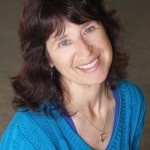Betsy Rosenthal has enjoyed writing ever since she was able to hold a pen. “I loved to write in diaries, you know those tiny diaries that lock, and I used to go through those like crazy,” she says. “I would fill them up with my thoughts and private matters. I also wrote poetry all the time—when I was sad or if something in particular inspired me.” Though Rosenthal loved to write, she felt that her happy childhood might be detrimental to a writing career. “In reading a lot of books, I realized that these writers had very traumatic childhoods,” she says. “I used to think maybe I won’t be a writer because I don’t have any tragedies [in my life].”
In spite of her passion for writing, Rosenthal initially chose a different career path with her acceptance to UCLA law school. “My parents used to comment on how much I enjoyed a good argument,” she says. Rosenthal worked for the anti-defamation league, a nonprofit civil rights organization, but the frequent travel and evening meetings did not mesh with motherhood. When her second child was born, she left law to spend time with her family.
Reading to her kids reignited Rosenthal’s interest in writing. “Some [books] were wonderful and inspiring and I really enjoyed reading them,” she says. Others were not, but they challenged her to see if she could write a better book. Children’s book writing courses at UCLA gave her the confidence to try. She submitted a collection of poems about sounds, smells, and happenings in her home to a local writing contest and won. “It validated me,” she says, “and started me on the path that ultimately become my first book, My House is Singing.”
Other books about her family followed. The initial seed for Which Shoes Would You Choose came from her son who changed out of his school sneakers into tap shoes for a play he was in, and then changed out of his tap shoes into cleats for flag football. “When I was a kid we had dressy shoes and tennis shoes,” Rosenthal says, but kids today have a different pair of shoes for each activity in which they are involved.
Looking for Me…in this great big family is the book closest to Rosenthal’s heart because it is based on family stories she heard from her mother and her aunts and uncles. The main character, Edith, is Rosenthal’s’ mother as a young girl growing up in depression-era Baltimore. While the middle-grade novel has some tragic moments (the economic downturn and anti-Semitism), Rosenthal also teases out the mischief and adventure inherent in a large family: jumping on the bed hard enough for it to crash through the floor, and the kids sneaking pie from their parents’ diner.
The heart of the book, though, turns on Edith’s self-discovery. “[My mother] didn’t know what her place was in her big family,” Rosenthal says. Edith, the fourth of twelve children, feels overshadowed and is forced to assume adult responsibilities when she begins working at her parents’ diner at the age of ten. Like Rosenthal’s mother, Edith discovers her specialness thanks to the encouragement and inspiration of a caring teacher.
For her research, Rosenthal traveled to Baltimore with an audio recorder in hand. She gathered stories from her aunts and uncles about their childhood adventures. Her mother recounted many of her favorite memories before the onset of Alzheimer’s. “She was still pretty sharp when I was writing the book,” Rosenthal says. “I’m really proud of this book because I got her memories down on paper when she still had them.”
Rosenthal’s most recent book, An Ambush of Tigers was chosen as a 2015 50 Best Books for Summer by Scholastic’s Instructor magazine. The book uses wordplay and rhyme to introduce collective animal names, e.g. a prickle of porcupines and a parcel of penguins. The inspiration for the book stemmed from a souvenir glass animal collection from childhood. “I collected them in groups,” she said. “I had a whole bunch of dogs, and a bunch of deer, and a bunch of horses. I even had a skunk family.” Or perhaps she meant to say a pack of dogs, a herd of deer, a stable of horses and a surfeit of skunks?
Revision lies at the core of Rosenthal’s success. “The one thing I tell students is the most important part of writing is revision,” she says. “If I can impart any wisdom to them it’s that they should write whatever they want to write, but it won’t ultimately be their final product. The best part is the changing.” Rosenthal practices what she preaches, too. She asks her peer critique group to read her work numerous times, revising in between, before she submits to an editor.
During the artistic process Rosenthal sometimes struggles with self-discipline. She starts her day with exercise in the hills of her Pacific Palisades neighborhood in Southern California, followed by breakfast, checking email and Facebook, and doing laundry. In order to ward off temptation, she frequents a local coffee shop that does not have Internet access.
When she’s not writing, Rosenthal “plays a mean game of badminton” every week on indoor courts at her local park. “It’s fun! One of our players played up until she turned 90.” But her heart’s desire is writing. “It’s the culmination of the things I most enjoyed when I was younger,” she says.


